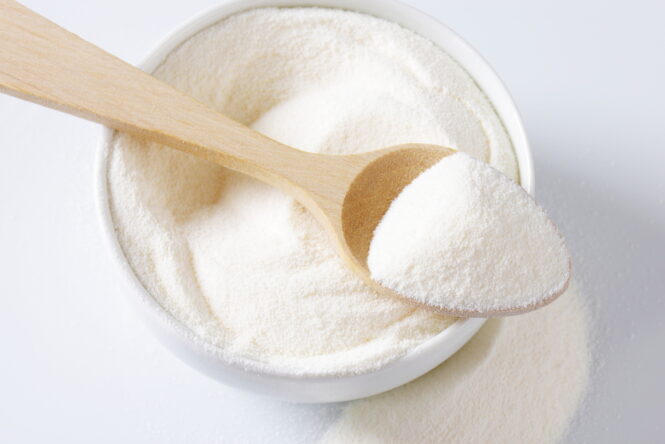Holle Bio baby formula is a high-quality organic baby formula developed in Switzerland. The mixture is produced with just the purest organic components that have been specifically chosen and prepared to give the optimum nourishment for newborns.
In this post, we will look at the different components of Holle Bio baby formula and how they play a part in giving critical nutrition to newborns.
Milk:
Dairy milk is the main element of Holle Bio infant formula. Holle Bio formula contains dairy from cows bred on sustainable fields without hormones or synthetic antibiotics. Organic milk is high in critical elements such as calcium, protein, and vitamins necessary for a baby’s well-being.
Lactose:

Lactose is a naturally occurring carbohydrate present in milk. It is essential in Holle Bio infant formula since it gives newborns strength. Lactose is necessary for calcium and other elements uptake in milk.
Vegetable Oil:
Holle Bio infant formula also includes an ethical vegetable oil combination that provides palm, rapeseed, sunflower, and coconut oil. Certain oils in the mix offer vital fatty acids such as Omega-3 and Omega-6. These lipids are necessary for enhancing the nervous system, brain, and vision.
Whey Protein:
Holle Bio formula includes whey protein, a top-quality, easily digestible protein. Whey protein is critical in infant formula because it contains vital proteins necessary for a child’s healthy development and well-being.
The Impact of Protein Sources on Baby Formula
Protein is a crucial nutrient for infants, as it plays a vital role in their growth and development. However, the source of protein in baby formula can have a significant impact on its nutritional value and potential health benefits.
Most of them use cow’s milk protein as their primary protein source. However, some infants may be allergic or intolerant to cow’s milk protein and may require alternative protein sources such as soy, hydrolyzed whey, or amino acid-based formulas.
Hydrolyzed formulas break down protein into smaller molecules, making them easier for infants to digest. They may be beneficial for infants with digestive issues or allergies to cow’s milk protein. Amino acid-based formulas use individual amino acids as the protein source, making them suitable for infants with severe allergies or intolerances.
It is important for parents to choose one that meets their infant’s specific nutritional needs and takes into account any allergies or intolerances. Consulting with a pediatrician can help determine the appropriate protein source and amount for an infant’s diet.

Minerals and Vitamins:
Holle Bio baby formula is additionally supplemented with various critical nutrients and elements necessary for a baby’s well-being. Vitamins A, C, D, E, K, and B-complex vitamins are among them, as are elements such as calcium, iron, and zinc.
Understanding the Role of Carbohydrates
Carbohydrates play a crucial role in baby formula, as they provide energy for growing infants. Lactose, a type of carbohydrate found in breast milk, is the primary carbohydrate used in most baby formulas. Lactose is important for brain development and provides a source of galactose, a sugar that is essential for the development of certain tissues and organs.
Some of them may also contain other types of carbohydrates such as maltodextrin or corn syrup solids. These carbohydrates provide additional energy for infants who may require a higher caloric intake, such as premature or low birth weight infants.
It is important for parents to be aware of the type and amount of carbohydrates in their baby’s formula. Excessive carbohydrate intake can lead to issues such as excessive weight gain or dental decay, while insufficient carbohydrate intake can lead to low energy levels and poor growth.
Parents should consult with a pediatrician to ensure their baby is receiving an appropriate amount of carbohydrates in their diet. Infants may require different amounts of carbohydrates depending on their age, weight, and overall health. It is also important to choose a formula that meets an infant’s specific nutritional needs and does not contain excessive amounts of added sugars.
Calcium Carbonate:
Calcium carbonate is a necessary component in infant formula because it promotes the growth of teeth and bones that are durable. Children require appropriate calcium levels in their food to promote the advancement and maintenance of developing skeletal structures. Calcium carbonate is a calcium supply that is highly accessible and quickly taken in by the body.
Choline Bitartrate:
Choline bitartrate is a necessary vitamin for cerebral growth and declarative memory. It also aids in the operation and detoxification of the liver. Choline is required to synthesize cholinergic, a transmitter that aids learning, remembering, and muscular performance. Infants require enough choline levels in their meals to promote their brain skills.
The benefits of using organic ingredients

Using organic ingredients in baby formula can provide numerous benefits for infants. Organic farming practices avoid the use of synthetic pesticides, fertilizers, and genetically modified organisms (GMOs), which can expose infants to harmful chemicals and toxins. The use of organic ingredients in baby formula can help reduce the risk of infants developing allergies or other health conditions later in life.
They also tend to have higher nutrient content than conventionally grown ingredients. For example, organic milk has been found to have higher levels of omega-3 fatty acids, which are important for brain development. Additionally, organic ingredients are often free from antibiotics and growth hormones, which can negatively impact an infant’s health and development.
By choosing organic baby formula, parents can also support sustainable and environmentally friendly farming practices. Organic farming practices prioritize soil health, crop rotation, and biodiversity, which can contribute to healthier ecosystems and reduce the carbon footprint of agriculture.
Conclusion:

Finally, Holle Bio baby formula is created with only the best natural foods that are hand-picked and prepared to give newborns critical nourishment. Organic milk, lactose, vegetable oils, whey protein, vitamins, minerals, prebiotics, and probiotics are among the elements in the formulation that are crucial for a baby to thrive.
Holle Bio baby formula is a quality organic formula that gives newborns the most significant nutrients. It is a popular suggestion among families who value their kids’ nutrition and well-being. So, what are you waiting for?
 Imagup General Magazine 2024
Imagup General Magazine 2024



